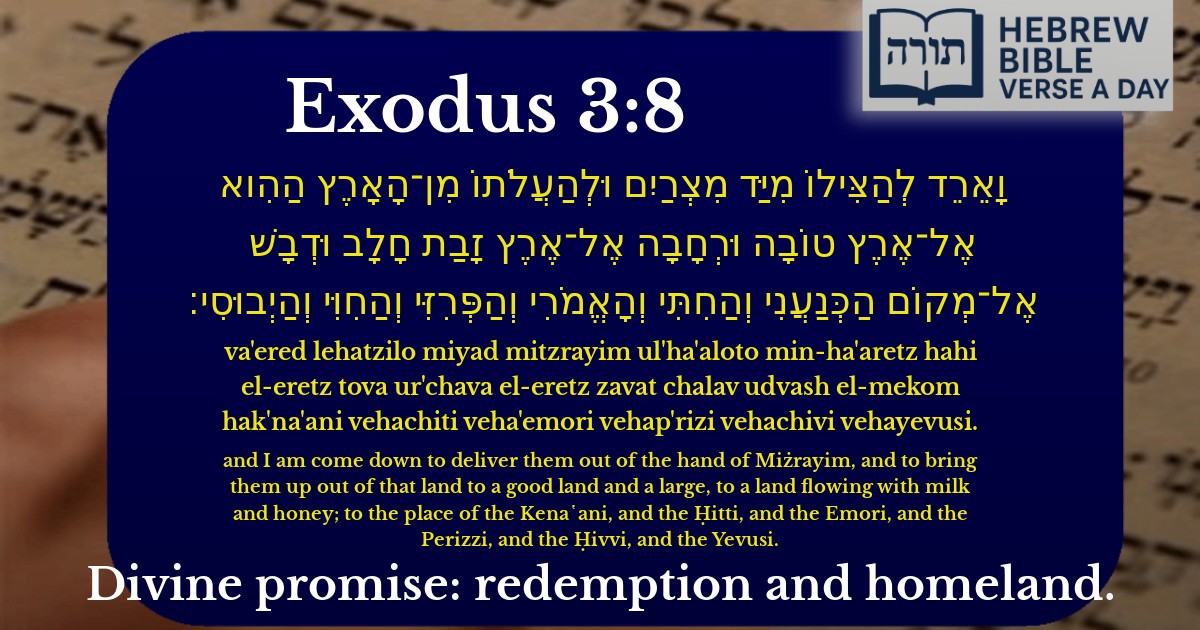Join Our Newsletter To Be Informed When New Videos Are Posted
Join the thousands of fellow Studends who rely on our videos to learn how to read the bible in Hebrew for free!
Hebrew Text
וָאֵרֵד לְהַצִּילוֹ מִיַּד מִצְרַיִם וּלְהַעֲלֹתוֹ מִן־הָאָרֶץ הַהִוא אֶל־אֶרֶץ טוֹבָה וּרְחָבָה אֶל־אֶרֶץ זָבַת חָלָב וּדְבָשׁ אֶל־מְקוֹם הַכְּנַעֲנִי וְהַחִתִּי וְהָאֱמֹרִי וְהַפְּרִזִּי וְהַחִוִּי וְהַיְבוּסִי׃
English Translation
and I am come down to deliver them out of the hand of Miżrayim, and to bring them up out of that land to a good land and a large, to a land flowing with milk and honey; to the place of the Kena῾ani, and the Ḥitti, and the Emori, and the Perizzi, and the Ḥivvi, and the Yevusi.
Transliteration
Va'ered lehatzilo miyad mitzrayim ul'ha'aloto min-ha'aretz hahi el-eretz tova ur'chava el-eretz zavat chalav udvash el-mekom hak'na'ani vehachiti veha'emori vehap'rizi vehachivi vehayevusi.
Hebrew Leining Text
וָאֵרֵ֞ד לְהַצִּיל֣וֹ&thinsp
וָאֵרֵ֞ד לְהַצִּיל֣וֹ&thinsp
🎵 Listen to leining
Parasha Commentary
📚 Talmud Citations
This verse is not quoted in the Talmud.


Divine Intervention and Redemption
The verse (Shemot 3:8) describes Hashem's promise to descend and redeem Bnei Yisrael from Mitzrayim. Rashi explains that the phrase "וָאֵרֵד" ("I am come down") signifies Hashem's direct involvement in the redemption, emphasizing that He does not merely send an agent but intervenes Himself. This mirrors the language used earlier in the Torah (Bereishit 11:5) when Hashem "descended" to witness the Tower of Bavel, showing His attentive governance of human affairs.
The Land of Israel: A Divine Gift
The description of Eretz Yisrael as "טוֹבָה וּרְחָבָה" ("good and spacious") reflects its spiritual and physical bounty. Rambam (Hilchot Melachim 5:10) notes that the land's inherent kedusha (holiness) makes it uniquely suited for divine service. The phrase "זָבַת חָלָב וּדְבָשׁ" ("flowing with milk and honey") is interpreted by the Sifrei (Devarim 26:9) as symbolic of abundance—milk representing pastoral wealth and honey (from dates) representing agricultural prosperity.
The Seven Nations and Their Significance
The listing of the seven nations—Kena'ani, Ḥitti, Emori, Perizzi, Ḥivvi, and Yevusi—serves multiple purposes in Jewish thought:
The Dual Nature of Redemption
The verse frames redemption in two parts: 1) "לְהַצִּילוֹ מִיַּד מִצְרַיִם" ("to deliver from Mitzrayim")—physical liberation from slavery; and 2) "וּלְהַעֲלֹתוֹ... אֶל־אֶרֶץ טוֹבָה" ("to bring them up to a good land")—spiritual elevation through settling Eretz Yisrael. The Kli Yakar (Shemot 3:8) highlights this duality, noting that true geulah (redemption) requires both freedom from oppression and ascent to a divine purpose.